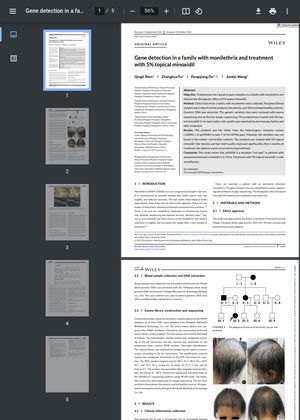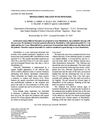Gene Detection in a Family With Monilethrix and Treatment With 5% Topical Minoxidil
November 2022
in “
Skin research and technology
”

TLDR 5% topical minoxidil improves hair density and quality in monilethrix patients.
This study reports on a 16-year-old girl with autosomal dominant monilethrix, a rare congenital hair disorder characterized by beaded hair shafts and hair fragility. Genetic analysis identified a heterozygous missense variant c.1204G > A (p.E402K) in the KRT86 gene, a known mutation site for this condition. The patient was treated with 5% topical minoxidil, which significantly improved hair density and quality after 6 months, with no adverse effects. This case supports the efficacy of minoxidil in treating monilethrix and highlights the p.E402K mutation as a prevalent variant in Chinese patients.






